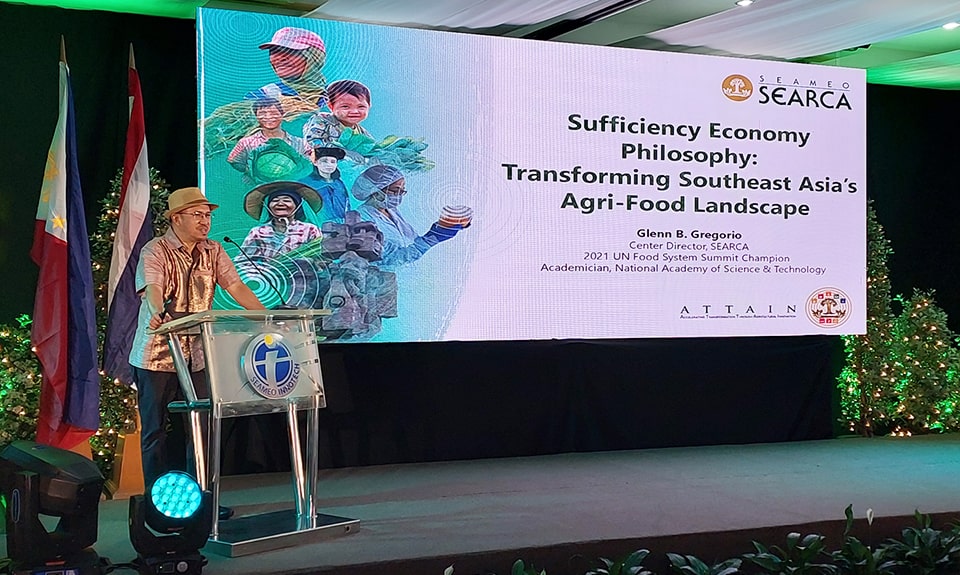
QUEZON CITY, Philippines—The Royal Thai Embassy Manila, in collaboration with Kasetsart University (KU), the Southeast Asian Ministers of Education Organization Regional Center for Educational Innovation and Technology (SEAMEO INNOTECH), Philippine Department of Education, the Southeast Asian Regional Center for Graduate Study and Research in Agriculture (SEARCA), and the University of the Philippines Los Baños, co-organized the Symposium on Sufficiency Economy and Sustainable Development held on 27 August 2024 at SEAMEO INNOTECH. The event is part of the year-long celebration of the 75th anniversary of diplomatic relations between Thailand and the Philippines.
The symposium highlighted "Sufficiency Economy Philosophy," established by His Majesty King Bhumibol Adulyadej of Thailand to improve the lives of the Thai people and foster their genuine and lasting happiness. Its goal is to promote balanced and stable development at all levels—individual, family and community, and society—by developing people's ability to cope with unprecedented challenges posed by extensive and rapid changes. The philosophy emphasizes moderation, reasonableness, and prudence as key principles for achieving sustainable development.
Dr. Glenn Gregorio, SEARCA Center Director, delivered a special lecture on "Sufficiency Economy Philosophy: Transforming Southeast Asia's Agri-Food Landscape." He discussed the alignment between the sufficiency economy philosophy and the Center's thrusts and programs.
"Over the years, SEARCA's thrust has evolved from productivity and support systems to include farming systems, agribusiness development, natural resource management, and inclusive and sustainable agricultural and rural development systems. Now, we rethought our approach, particularly in how we perceive agriculture, food, and food production, and came up with Accelerating Transformation Through Agricultural Innovation (ATTAIN)," Dr. Gregorio shared.
"ATTAIN embodies the sufficiency economy philosophy. We now approach agriculture, agri-innovation, and agribusiness with a heart," he explained.
"With every technology you present to the farmers, they will assess them based on your intentions, so it's crucial to put your heart into it. That is where sufficiency economy philosophy will come in," he explained," he continued.
As an example of the Center's initiatives grounded in the sufficiency economy philosophy, Dr. Gregorio introduced the School-plus-Home Gardens Program (S+HGP). The project aimed to improve school children's nutrition, education, and economic well-being. It supported two DepEd initiatives: the Gulayan sa Paaralan Program and the School-based Feeding Program. Initially piloted in six schools in Laguna, Philippines, S+HGP has now expanded to Rizal and Palawan, Philippines and Cambodia, through its offshoot projects: School Edible Landscaping for Entrepreneurship (SEL4E) Project, which focuses on entrepreneurship, and School-plus-Home Gardens cum Biodiversity Enhancement Enterprise (SHGBEE), which aligns with biodiversity conservation and restoration.
 Dr. Glenn Gregorio, SEARCA Center Director with His Excellency Tull Traisorat, Ambassador of the Kingdom of Thailand to the Republic of the Philippines
Dr. Glenn Gregorio, SEARCA Center Director with His Excellency Tull Traisorat, Ambassador of the Kingdom of Thailand to the Republic of the Philippines
The symposium was attended by representatives of the Royal Thai Embassy Manila, led by His Excellency Tull Traisorat, Ambassador of the Kingdom of Thailand to the Republic of the Philippines. Also present were officials from various government agencies, academic institutions, international organizations, and junior high school students.